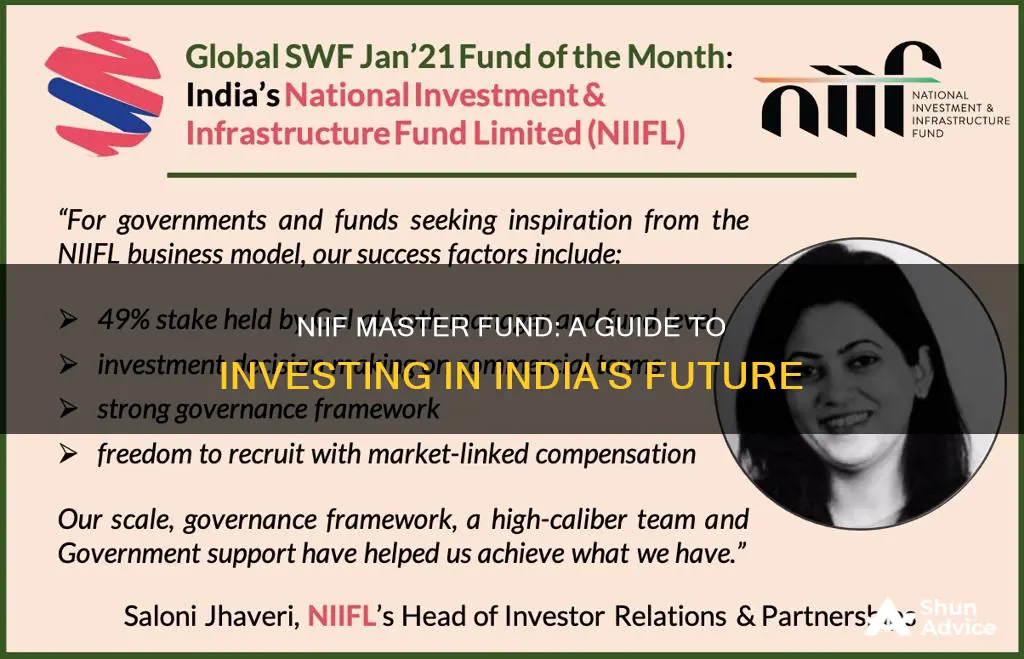
The National Investment and Infrastructure Fund (NIIF) is India's first sovereign wealth fund, established by the Indian government in 2015 to optimise the economic impact of infrastructure-related projects. The NIIF Master Fund is the largest infrastructure fund in India, with over $1.8 billion in commitments and a target size of $2.1 billion. It focuses on core infrastructure and operating assets in sectors such as roads, ports, airports, and power. The fund invests in well-established enterprises with long-term agreements, operating in a regulated environment with a strong track record. The NIIF Master Fund offers a unique opportunity for investors to support India's infrastructure development while potentially achieving stable cash inflows and a diversified portfolio.
What You'll Learn

The NIIF Master Fund's focus on core infrastructure
The NIIF Master Fund is the largest infrastructure fund in India, with commitments of over $1.8 billion and a target size of $2.1 billion. It focuses on core infrastructure and operating assets in sectors such as roads, ports, airports, and power. The Master Fund primarily invests in well-established enterprises with long-term agreements that operate in a regulated environment with a strong track record.
The fund's strategy involves establishing sector-specific companies in association with prominent partners to build a diversified portfolio. By investing in core infrastructure sectors, the Master Fund aims to support the long-term growth trajectory of the Indian economy.
One notable investment by the Master Fund was its partnership with DP World in February 2018 to invest in the ports and logistics sector in India. Together, they announced a $3 billion investment in the platform. Subsequently, Hindustan Infralog, the joint venture between NIIF and DP World, acquired a 90% stake in the logistics firm Continental Warehousing.
The Master Fund has also expanded its investments in other core infrastructure sectors. In October 2019, it partnered with Energy Efficiency Services Limited (EESL) to create IntelliSmart Infrastructure Private Limited, focusing on the smart meter roll-out program. Additionally, the fund has acquired several road projects, including the Essel Devanahalli Tollway and the Essel Dichpally Tollway, which are managed by its proprietary roads platform, Athaang Infrastructure.
In December 2022, the Master Fund announced a financial partnership with GMR Airports Limited, investing in the equity capital of three airport projects, including greenfield international airports in Goa and Andhra Pradesh. The Master Fund continues to seek opportunities to invest in core infrastructure and operating assets across various sectors in India.
Mid-Cap Funds: Smart Investment Timing for Optimal Returns
You may want to see also

The Fund's investors and investment strategy
The National Investment and Infrastructure Fund (NIIF) is India's first sovereign wealth fund, established by the Government of India to provide infrastructure investment and maximise the economic impact of commercially available projects. The fund aims to raise capital through suitable instruments, attract anchor investors, and service investors.
The NIIF manages four funds: Master Fund, Private Markets, Strategic Opportunities Fund, and India-Japan Fund. The funds were set up to make investments in India by raising capital from domestic and international institutional investors.
The Master Fund, the largest infrastructure fund in India, focuses on core infrastructure and operating assets in sectors such as roads, ports, airports, and power. It has commitments of over $1.8 billion, exceeding its target size of $2.1 billion. The fund invests in well-established enterprises with long-term agreements, operating in a regulated environment with a strong track record. It also establishes sector-specific companies in association with prominent companies to build a diversified portfolio.
The Master Fund has seven platforms across ports and logistics, smart meters, renewable energy, roads, airports, and digital infrastructure. It has partnered with companies like DP World, BII (formerly CDC Group), and EverSource Capital to invest in India's infrastructure and renewable energy sectors.
The fund's investors include the Government of India (holding a 49% share), Abu Dhabi Investment Authority (ADIA), Temasek, Ontario Teachers' Pension Plan, AustralianSuper, CPP Investments, PSP Investments, US International Development Finance Corporation, and domestic institutional investors such as HDFC Group, ICICI Bank, Kotak Mahindra Life, and Axis Bank.
Business Fund Investments: Expansion Strategies and Opportunities
You may want to see also

How the Master Fund differs from the Private Markets Fund
The Master Fund and the Private Markets Fund (PMF) are two of the four funds managed by the National Investment and Infrastructure Fund (NIIF). The Master Fund is an infrastructure fund that primarily invests in operating assets in core infrastructure sectors such as roads, ports, airports, and power. On the other hand, the Private Markets Fund is a USD 600 million fund that anchors and/or invests in funds managed by fund managers with a proven track record of delivering returns to investors.
The Master Fund differs from the Private Markets Fund in several key ways:
Investment Focus
The Master Fund focuses on investing in established enterprises with long-term agreements, operating in regulated environments with a strong track record. It primarily targets infrastructure-related projects and forms sector-specific companies in partnership with prominent companies. On the other hand, the Private Markets Fund anchors and/or invests in funds managed by experienced fund managers. It provides capital to these funds, allowing them to make investments in various sectors driving India's economic growth, such as climate, healthcare, affordable housing, and technology-enabled businesses.
Investment Structure
The Master Fund operates within a master-feeder structure, where investor capital is deposited into feeder funds, which then invest in a centralized master fund. This structure allows for the consolidation of various portfolios, reducing operational and trading costs. The Private Markets Fund, on the other hand, does not explicitly mention operating within a master-feeder structure. Instead, it functions as a fund-of-funds, investing in multiple funds managed by different fund managers.
Investment Strategy
The Master Fund's strategy is to invest directly in businesses and assets within core infrastructure sectors. It seeks to establish sector-specific companies in partnership with prominent companies. In contrast, the Private Markets Fund's strategy is to provide capital to experienced fund managers, allowing them to make investments across various sectors. The Private Markets Fund does not invest directly in businesses or assets but rather in funds that then make those investments.
Investment Size
The Master Fund has a larger investment size, with a final close of USD 2.34 billion in December 2020, exceeding its target of USD 2.1 billion. On the other hand, the Private Markets Fund is a USD 600 million fund, with a portfolio of eight funds across various strategies.
Investor Type
The Master Fund attracts both foreign and domestic investors, including the Government of India, the Abu Dhabi Investment Authority (ADIA), Temasek, and domestic institutional investors such as HDFC Group, ICICI Bank, and Axis Bank. The Private Markets Fund also has the Government of India as an investor, along with the Asian Infrastructure Investment Bank, the Asian Development Bank, and the New Development Bank.
Best Banks for Investment: Where to Invest Your Money?
You may want to see also

The Fund's joint ventures and acquisitions
The NIIF Master Fund has 7 platforms across ports and logistics, smart meters, renewable energy, roads, airports, and digital infrastructure.
In February 2018, the Master Fund created its first platform with DP World to invest in the ports and logistics sector in India. Together, NIIF and DP World announced a $3 billion investment in the platform. In March 2018, Hindustan Infralog, the joint venture platform between DP World and NIIF, acquired a 90% stake in the logistics firm Continental Warehousing. In June 2022, NIIF expanded its partnership with DP World by investing approximately $300 million to acquire a 22.5% stake in Hindustan Ports Pvt Ltd (HPPL), a wholly-owned subsidiary of DP World.
In February 2019, the Master Fund announced a partnership with BII (formerly known as CDC Group) and EverSource Capital to cumulatively invest $300 million in Ayana Renewable Power, a renewable energy platform founded by BII. Following an additional capital injection in December 2020, the Master Fund became the majority shareholder in the company.
In October 2019, the Master Fund and Energy Efficiency Services Limited (EESL) announced the creation of IntelliSmart Infrastructure Private Limited, a joint venture to implement, finance, and operate the smart meter roll-out program of power distribution companies.
In November 2020, NIIF announced the acquisition of two toll roads in the states of Karnataka and Telangana through the Master Fund. These roads are managed by Athaang Infrastructure, NIIF's proprietary roads platform. In 2022, NIIF announced the acquisition of two additional roads in Jammu & Kashmir, which will also be managed by Athaang Infrastructure.
In December 2022, GMR Airports Limited (GAL) and NIIF announced a financial partnership for NIIF to invest in the equity capital of three airport projects: the greenfield international airports at Mopa, Goa, and Bhogapuram, Andhra Pradesh. In December 2023, NIIF announced an investment of up to INR 6.75 billion in GMR Visakhapatnam International Airport Limited (GVIAL), a special purpose vehicle to develop and operate the Bhogapuram International Airport.
In January 2023, NIIF formed a partnership with Digital Edge (Singapore) Holdings Pte. Ltd. and AGP DC InvestCo Pte Ltd to develop a pan-India portfolio of hyperscale data centres. The partnership's first project is a $2 billion greenfield 300MW hyperscale facility in Navi Mumbai, India's largest data centre hub.
In April 2024, NIIF announced an investment of around $200 million in iBUS Network and Infrastructure Private Limited to support the growth of India's digital infrastructure.
A Guide to Investing in Bridgewater's Alpha Fund
You may want to see also

The Fund's role in India's economic growth
The National Investment and Infrastructure Fund (NIIF) is India's first sovereign wealth fund, established by the Indian government in 2015. The primary goal of the NIIF is to optimise the economic impact of infrastructure-related projects by providing long-term capital. The NIIF currently manages four funds, with a total of over USD 4.9 billion in assets under management.
The NIIF's role in India's economic growth is significant. The fund aims to catalyse capital into the country and support its growth needs across various sectors. The NIIF's investment strategy focuses on infrastructure and related sectors, such as roads, ports, airports, power, and renewable energy. By investing in these sectors, the NIIF helps to develop and improve India's infrastructure, which is crucial for economic growth.
The NIIF's Master Fund, in particular, plays a crucial role in India's economic growth. As the largest infrastructure fund in India, with commitments of over USD 1.8 billion, the Master Fund invests primarily in core infrastructure and operating assets. It targets well-established enterprises with long-term agreements, operating in a regulated environment with a strong track record. This approach helps to create a hedge against inflation and provides stable cash inflows. Additionally, the Master Fund establishes sector-specific companies in association with prominent partners, diversifying its portfolio and mitigating risks.
The NIIF's other funds also contribute to India's economic growth. The Private Markets Fund, with USD 600 million in commitments, invests in funds managed by experienced fund managers across various sectors, including climate, healthcare, affordable housing, and technology-enabled businesses. The Strategic Opportunities Fund focuses on developing large-scale businesses and greenfield projects of strategic importance to India, with a target size of USD 3 billion. Finally, the India-Japan Fund, NIIF's first bilateral fund, invests in environmental preservation and fosters collaboration between Indian and Japanese companies.
Overall, the NIIF plays a vital role in India's economic growth by providing much-needed capital for infrastructure development and supporting various sectors driving the country's growth. The fund's ability to attract both domestic and international investors demonstrates its potential to positively impact India's economy and achieve its long-term growth objectives.
A Beginner's Guide to Mutual Fund Investing in Europe
You may want to see also
Frequently asked questions
The NIIF Master Fund is the largest infrastructure fund in India, with commitments of over $1.8 billion. It focuses on core infrastructure and operating assets in sectors such as roads, ports, airports, and power.
The NIIF Master Fund invests in well-established enterprises with long-term agreements, operating in a regulated environment with a good history. It also establishes sector-specific companies in association with prominent companies to build a diversified portfolio.
The NIIF Master Fund is majority-owned by institutional investors, including international investors such as ADIA, Temasek, and domestic financial institutions like HDFC, Kotak Mahindra Bank, Axis Bank, and ICICI Bank.
The NIIF Master Fund offers investors the opportunity to invest in India's infrastructure development, which is crucial for the country's economic growth. It provides a stable cash inflow as the fund invests in businesses that act as a hedge during inflationary times.
To invest in the NIIF Master Fund, one would need to reach out to the fund managers or the relevant government body for information on investment procedures and eligibility. The NIIF is a collaborative investment platform, so it actively seeks investments from global institutional investors and domestic financial institutions.







